Google Assistant: An Analysis of Business Ethics and Ethical Issues
VerifiedAdded on 2021/06/18
|9
|2714
|101
Essay
AI Summary
This essay delves into the ethical issues surrounding Google's Duplex AI assistant, which mimics human conversation. The core argument revolves around whether Duplex should disclose its robotic identity during interactions, as the current design potentially violates human rights by deceiving users. The essay summarizes arguments from an article discussing this technology, highlighting concerns about potential misuse by marketers and political campaigns. It explores the ethical implications of the technology, citing examples like Microsoft's Tay AI and Wikipedia bots, and Uber's self-driving car tests, to illustrate the potential dangers of unchecked AI development. The essay also analyzes the ethical issues through the lens of deontological moral philosophy, emphasizing the importance of individual rights and transparency. It concludes that Google should prioritize transparency and ethical considerations in the development and deployment of AI technologies to safeguard human rights and maintain public trust.
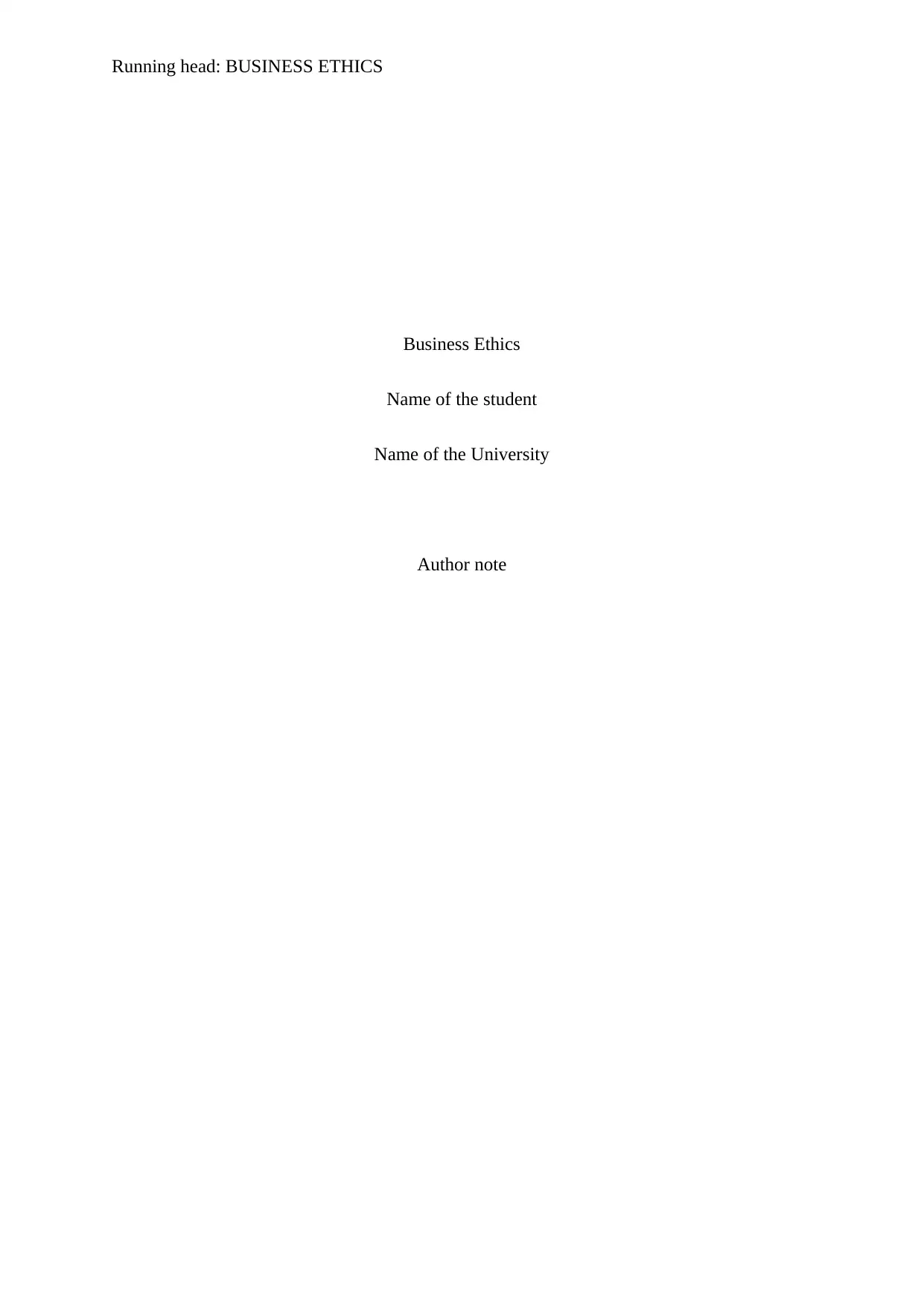
Running head: BUSINESS ETHICS
Business Ethics
Name of the student
Name of the University
Author note
Business Ethics
Name of the student
Name of the University
Author note
Paraphrase This Document
Need a fresh take? Get an instant paraphrase of this document with our AI Paraphraser
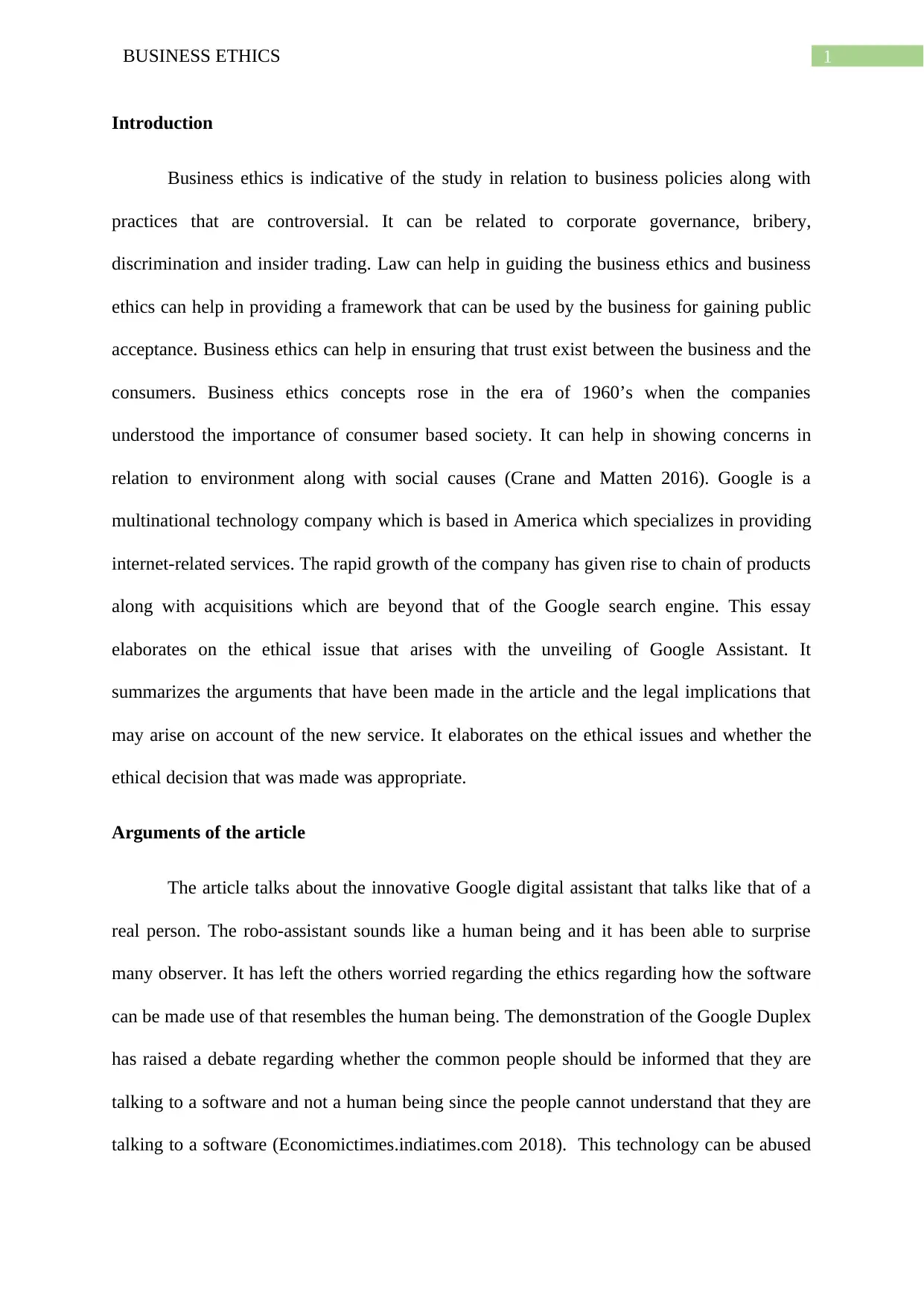
1BUSINESS ETHICS
Introduction
Business ethics is indicative of the study in relation to business policies along with
practices that are controversial. It can be related to corporate governance, bribery,
discrimination and insider trading. Law can help in guiding the business ethics and business
ethics can help in providing a framework that can be used by the business for gaining public
acceptance. Business ethics can help in ensuring that trust exist between the business and the
consumers. Business ethics concepts rose in the era of 1960’s when the companies
understood the importance of consumer based society. It can help in showing concerns in
relation to environment along with social causes (Crane and Matten 2016). Google is a
multinational technology company which is based in America which specializes in providing
internet-related services. The rapid growth of the company has given rise to chain of products
along with acquisitions which are beyond that of the Google search engine. This essay
elaborates on the ethical issue that arises with the unveiling of Google Assistant. It
summarizes the arguments that have been made in the article and the legal implications that
may arise on account of the new service. It elaborates on the ethical issues and whether the
ethical decision that was made was appropriate.
Arguments of the article
The article talks about the innovative Google digital assistant that talks like that of a
real person. The robo-assistant sounds like a human being and it has been able to surprise
many observer. It has left the others worried regarding the ethics regarding how the software
can be made use of that resembles the human being. The demonstration of the Google Duplex
has raised a debate regarding whether the common people should be informed that they are
talking to a software and not a human being since the people cannot understand that they are
talking to a software (Economictimes.indiatimes.com 2018). This technology can be abused
Introduction
Business ethics is indicative of the study in relation to business policies along with
practices that are controversial. It can be related to corporate governance, bribery,
discrimination and insider trading. Law can help in guiding the business ethics and business
ethics can help in providing a framework that can be used by the business for gaining public
acceptance. Business ethics can help in ensuring that trust exist between the business and the
consumers. Business ethics concepts rose in the era of 1960’s when the companies
understood the importance of consumer based society. It can help in showing concerns in
relation to environment along with social causes (Crane and Matten 2016). Google is a
multinational technology company which is based in America which specializes in providing
internet-related services. The rapid growth of the company has given rise to chain of products
along with acquisitions which are beyond that of the Google search engine. This essay
elaborates on the ethical issue that arises with the unveiling of Google Assistant. It
summarizes the arguments that have been made in the article and the legal implications that
may arise on account of the new service. It elaborates on the ethical issues and whether the
ethical decision that was made was appropriate.
Arguments of the article
The article talks about the innovative Google digital assistant that talks like that of a
real person. The robo-assistant sounds like a human being and it has been able to surprise
many observer. It has left the others worried regarding the ethics regarding how the software
can be made use of that resembles the human being. The demonstration of the Google Duplex
has raised a debate regarding whether the common people should be informed that they are
talking to a software and not a human being since the people cannot understand that they are
talking to a software (Economictimes.indiatimes.com 2018). This technology can be abused
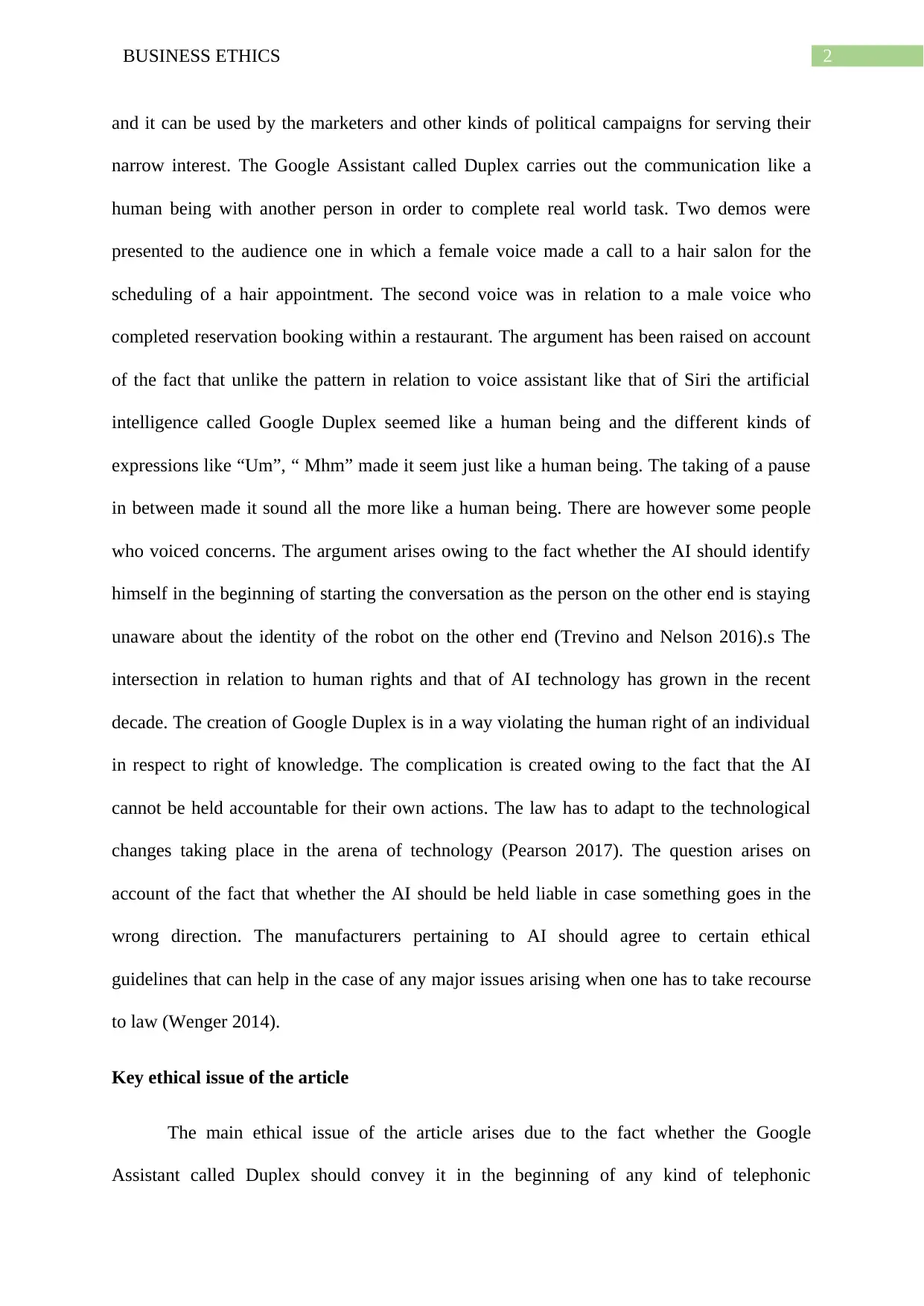
2BUSINESS ETHICS
and it can be used by the marketers and other kinds of political campaigns for serving their
narrow interest. The Google Assistant called Duplex carries out the communication like a
human being with another person in order to complete real world task. Two demos were
presented to the audience one in which a female voice made a call to a hair salon for the
scheduling of a hair appointment. The second voice was in relation to a male voice who
completed reservation booking within a restaurant. The argument has been raised on account
of the fact that unlike the pattern in relation to voice assistant like that of Siri the artificial
intelligence called Google Duplex seemed like a human being and the different kinds of
expressions like “Um”, “ Mhm” made it seem just like a human being. The taking of a pause
in between made it sound all the more like a human being. There are however some people
who voiced concerns. The argument arises owing to the fact whether the AI should identify
himself in the beginning of starting the conversation as the person on the other end is staying
unaware about the identity of the robot on the other end (Trevino and Nelson 2016).s The
intersection in relation to human rights and that of AI technology has grown in the recent
decade. The creation of Google Duplex is in a way violating the human right of an individual
in respect to right of knowledge. The complication is created owing to the fact that the AI
cannot be held accountable for their own actions. The law has to adapt to the technological
changes taking place in the arena of technology (Pearson 2017). The question arises on
account of the fact that whether the AI should be held liable in case something goes in the
wrong direction. The manufacturers pertaining to AI should agree to certain ethical
guidelines that can help in the case of any major issues arising when one has to take recourse
to law (Wenger 2014).
Key ethical issue of the article
The main ethical issue of the article arises due to the fact whether the Google
Assistant called Duplex should convey it in the beginning of any kind of telephonic
and it can be used by the marketers and other kinds of political campaigns for serving their
narrow interest. The Google Assistant called Duplex carries out the communication like a
human being with another person in order to complete real world task. Two demos were
presented to the audience one in which a female voice made a call to a hair salon for the
scheduling of a hair appointment. The second voice was in relation to a male voice who
completed reservation booking within a restaurant. The argument has been raised on account
of the fact that unlike the pattern in relation to voice assistant like that of Siri the artificial
intelligence called Google Duplex seemed like a human being and the different kinds of
expressions like “Um”, “ Mhm” made it seem just like a human being. The taking of a pause
in between made it sound all the more like a human being. There are however some people
who voiced concerns. The argument arises owing to the fact whether the AI should identify
himself in the beginning of starting the conversation as the person on the other end is staying
unaware about the identity of the robot on the other end (Trevino and Nelson 2016).s The
intersection in relation to human rights and that of AI technology has grown in the recent
decade. The creation of Google Duplex is in a way violating the human right of an individual
in respect to right of knowledge. The complication is created owing to the fact that the AI
cannot be held accountable for their own actions. The law has to adapt to the technological
changes taking place in the arena of technology (Pearson 2017). The question arises on
account of the fact that whether the AI should be held liable in case something goes in the
wrong direction. The manufacturers pertaining to AI should agree to certain ethical
guidelines that can help in the case of any major issues arising when one has to take recourse
to law (Wenger 2014).
Key ethical issue of the article
The main ethical issue of the article arises due to the fact whether the Google
Assistant called Duplex should convey it in the beginning of any kind of telephonic
⊘ This is a preview!⊘
Do you want full access?
Subscribe today to unlock all pages.

Trusted by 1+ million students worldwide
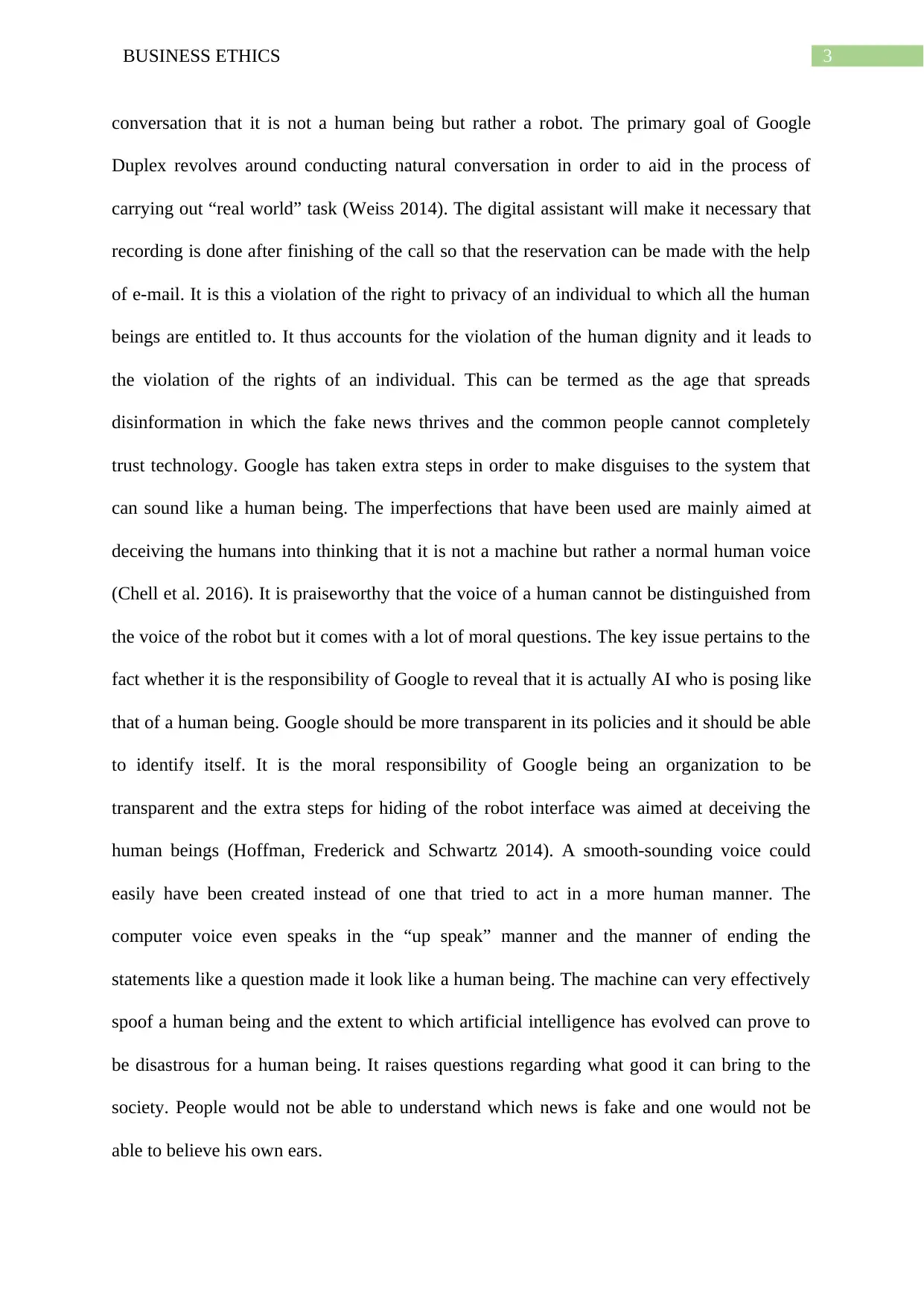
3BUSINESS ETHICS
conversation that it is not a human being but rather a robot. The primary goal of Google
Duplex revolves around conducting natural conversation in order to aid in the process of
carrying out “real world” task (Weiss 2014). The digital assistant will make it necessary that
recording is done after finishing of the call so that the reservation can be made with the help
of e-mail. It is this a violation of the right to privacy of an individual to which all the human
beings are entitled to. It thus accounts for the violation of the human dignity and it leads to
the violation of the rights of an individual. This can be termed as the age that spreads
disinformation in which the fake news thrives and the common people cannot completely
trust technology. Google has taken extra steps in order to make disguises to the system that
can sound like a human being. The imperfections that have been used are mainly aimed at
deceiving the humans into thinking that it is not a machine but rather a normal human voice
(Chell et al. 2016). It is praiseworthy that the voice of a human cannot be distinguished from
the voice of the robot but it comes with a lot of moral questions. The key issue pertains to the
fact whether it is the responsibility of Google to reveal that it is actually AI who is posing like
that of a human being. Google should be more transparent in its policies and it should be able
to identify itself. It is the moral responsibility of Google being an organization to be
transparent and the extra steps for hiding of the robot interface was aimed at deceiving the
human beings (Hoffman, Frederick and Schwartz 2014). A smooth-sounding voice could
easily have been created instead of one that tried to act in a more human manner. The
computer voice even speaks in the “up speak” manner and the manner of ending the
statements like a question made it look like a human being. The machine can very effectively
spoof a human being and the extent to which artificial intelligence has evolved can prove to
be disastrous for a human being. It raises questions regarding what good it can bring to the
society. People would not be able to understand which news is fake and one would not be
able to believe his own ears.
conversation that it is not a human being but rather a robot. The primary goal of Google
Duplex revolves around conducting natural conversation in order to aid in the process of
carrying out “real world” task (Weiss 2014). The digital assistant will make it necessary that
recording is done after finishing of the call so that the reservation can be made with the help
of e-mail. It is this a violation of the right to privacy of an individual to which all the human
beings are entitled to. It thus accounts for the violation of the human dignity and it leads to
the violation of the rights of an individual. This can be termed as the age that spreads
disinformation in which the fake news thrives and the common people cannot completely
trust technology. Google has taken extra steps in order to make disguises to the system that
can sound like a human being. The imperfections that have been used are mainly aimed at
deceiving the humans into thinking that it is not a machine but rather a normal human voice
(Chell et al. 2016). It is praiseworthy that the voice of a human cannot be distinguished from
the voice of the robot but it comes with a lot of moral questions. The key issue pertains to the
fact whether it is the responsibility of Google to reveal that it is actually AI who is posing like
that of a human being. Google should be more transparent in its policies and it should be able
to identify itself. It is the moral responsibility of Google being an organization to be
transparent and the extra steps for hiding of the robot interface was aimed at deceiving the
human beings (Hoffman, Frederick and Schwartz 2014). A smooth-sounding voice could
easily have been created instead of one that tried to act in a more human manner. The
computer voice even speaks in the “up speak” manner and the manner of ending the
statements like a question made it look like a human being. The machine can very effectively
spoof a human being and the extent to which artificial intelligence has evolved can prove to
be disastrous for a human being. It raises questions regarding what good it can bring to the
society. People would not be able to understand which news is fake and one would not be
able to believe his own ears.
Paraphrase This Document
Need a fresh take? Get an instant paraphrase of this document with our AI Paraphraser
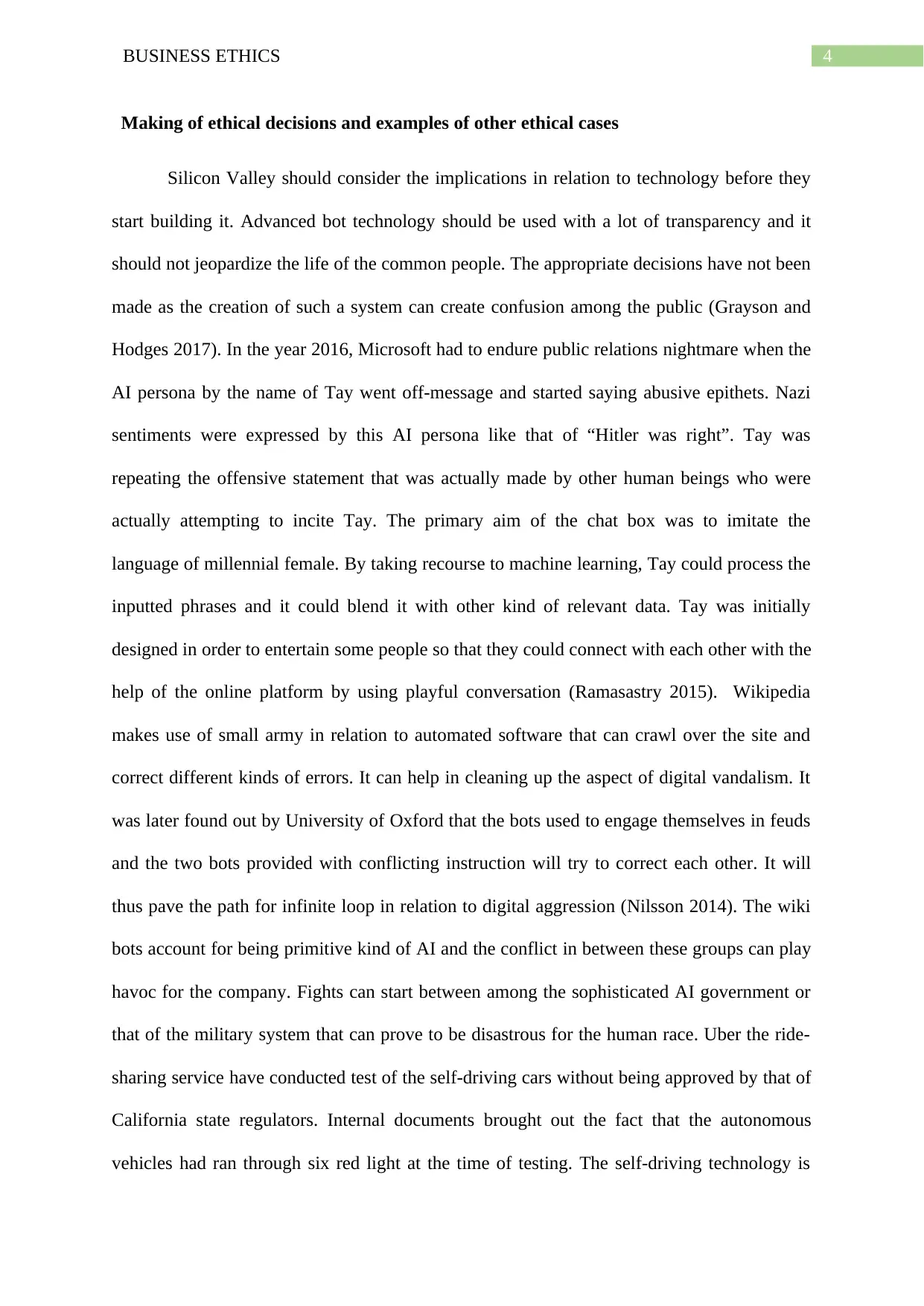
4BUSINESS ETHICS
Making of ethical decisions and examples of other ethical cases
Silicon Valley should consider the implications in relation to technology before they
start building it. Advanced bot technology should be used with a lot of transparency and it
should not jeopardize the life of the common people. The appropriate decisions have not been
made as the creation of such a system can create confusion among the public (Grayson and
Hodges 2017). In the year 2016, Microsoft had to endure public relations nightmare when the
AI persona by the name of Tay went off-message and started saying abusive epithets. Nazi
sentiments were expressed by this AI persona like that of “Hitler was right”. Tay was
repeating the offensive statement that was actually made by other human beings who were
actually attempting to incite Tay. The primary aim of the chat box was to imitate the
language of millennial female. By taking recourse to machine learning, Tay could process the
inputted phrases and it could blend it with other kind of relevant data. Tay was initially
designed in order to entertain some people so that they could connect with each other with the
help of the online platform by using playful conversation (Ramasastry 2015). Wikipedia
makes use of small army in relation to automated software that can crawl over the site and
correct different kinds of errors. It can help in cleaning up the aspect of digital vandalism. It
was later found out by University of Oxford that the bots used to engage themselves in feuds
and the two bots provided with conflicting instruction will try to correct each other. It will
thus pave the path for infinite loop in relation to digital aggression (Nilsson 2014). The wiki
bots account for being primitive kind of AI and the conflict in between these groups can play
havoc for the company. Fights can start between among the sophisticated AI government or
that of the military system that can prove to be disastrous for the human race. Uber the ride-
sharing service have conducted test of the self-driving cars without being approved by that of
California state regulators. Internal documents brought out the fact that the autonomous
vehicles had ran through six red light at the time of testing. The self-driving technology is
Making of ethical decisions and examples of other ethical cases
Silicon Valley should consider the implications in relation to technology before they
start building it. Advanced bot technology should be used with a lot of transparency and it
should not jeopardize the life of the common people. The appropriate decisions have not been
made as the creation of such a system can create confusion among the public (Grayson and
Hodges 2017). In the year 2016, Microsoft had to endure public relations nightmare when the
AI persona by the name of Tay went off-message and started saying abusive epithets. Nazi
sentiments were expressed by this AI persona like that of “Hitler was right”. Tay was
repeating the offensive statement that was actually made by other human beings who were
actually attempting to incite Tay. The primary aim of the chat box was to imitate the
language of millennial female. By taking recourse to machine learning, Tay could process the
inputted phrases and it could blend it with other kind of relevant data. Tay was initially
designed in order to entertain some people so that they could connect with each other with the
help of the online platform by using playful conversation (Ramasastry 2015). Wikipedia
makes use of small army in relation to automated software that can crawl over the site and
correct different kinds of errors. It can help in cleaning up the aspect of digital vandalism. It
was later found out by University of Oxford that the bots used to engage themselves in feuds
and the two bots provided with conflicting instruction will try to correct each other. It will
thus pave the path for infinite loop in relation to digital aggression (Nilsson 2014). The wiki
bots account for being primitive kind of AI and the conflict in between these groups can play
havoc for the company. Fights can start between among the sophisticated AI government or
that of the military system that can prove to be disastrous for the human race. Uber the ride-
sharing service have conducted test of the self-driving cars without being approved by that of
California state regulators. Internal documents brought out the fact that the autonomous
vehicles had ran through six red light at the time of testing. The self-driving technology is
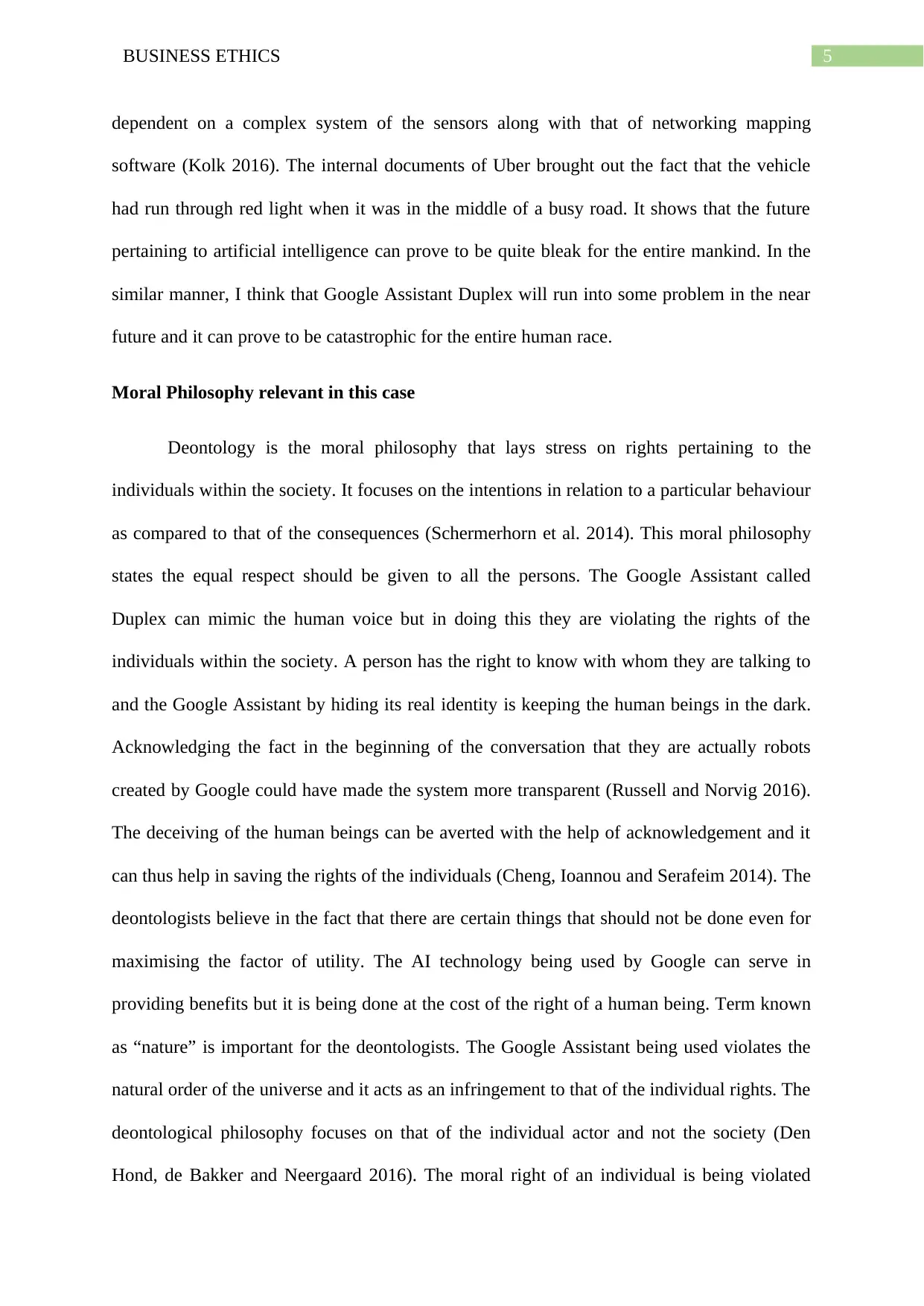
5BUSINESS ETHICS
dependent on a complex system of the sensors along with that of networking mapping
software (Kolk 2016). The internal documents of Uber brought out the fact that the vehicle
had run through red light when it was in the middle of a busy road. It shows that the future
pertaining to artificial intelligence can prove to be quite bleak for the entire mankind. In the
similar manner, I think that Google Assistant Duplex will run into some problem in the near
future and it can prove to be catastrophic for the entire human race.
Moral Philosophy relevant in this case
Deontology is the moral philosophy that lays stress on rights pertaining to the
individuals within the society. It focuses on the intentions in relation to a particular behaviour
as compared to that of the consequences (Schermerhorn et al. 2014). This moral philosophy
states the equal respect should be given to all the persons. The Google Assistant called
Duplex can mimic the human voice but in doing this they are violating the rights of the
individuals within the society. A person has the right to know with whom they are talking to
and the Google Assistant by hiding its real identity is keeping the human beings in the dark.
Acknowledging the fact in the beginning of the conversation that they are actually robots
created by Google could have made the system more transparent (Russell and Norvig 2016).
The deceiving of the human beings can be averted with the help of acknowledgement and it
can thus help in saving the rights of the individuals (Cheng, Ioannou and Serafeim 2014). The
deontologists believe in the fact that there are certain things that should not be done even for
maximising the factor of utility. The AI technology being used by Google can serve in
providing benefits but it is being done at the cost of the right of a human being. Term known
as “nature” is important for the deontologists. The Google Assistant being used violates the
natural order of the universe and it acts as an infringement to that of the individual rights. The
deontological philosophy focuses on that of the individual actor and not the society (Den
Hond, de Bakker and Neergaard 2016). The moral right of an individual is being violated
dependent on a complex system of the sensors along with that of networking mapping
software (Kolk 2016). The internal documents of Uber brought out the fact that the vehicle
had run through red light when it was in the middle of a busy road. It shows that the future
pertaining to artificial intelligence can prove to be quite bleak for the entire mankind. In the
similar manner, I think that Google Assistant Duplex will run into some problem in the near
future and it can prove to be catastrophic for the entire human race.
Moral Philosophy relevant in this case
Deontology is the moral philosophy that lays stress on rights pertaining to the
individuals within the society. It focuses on the intentions in relation to a particular behaviour
as compared to that of the consequences (Schermerhorn et al. 2014). This moral philosophy
states the equal respect should be given to all the persons. The Google Assistant called
Duplex can mimic the human voice but in doing this they are violating the rights of the
individuals within the society. A person has the right to know with whom they are talking to
and the Google Assistant by hiding its real identity is keeping the human beings in the dark.
Acknowledging the fact in the beginning of the conversation that they are actually robots
created by Google could have made the system more transparent (Russell and Norvig 2016).
The deceiving of the human beings can be averted with the help of acknowledgement and it
can thus help in saving the rights of the individuals (Cheng, Ioannou and Serafeim 2014). The
deontologists believe in the fact that there are certain things that should not be done even for
maximising the factor of utility. The AI technology being used by Google can serve in
providing benefits but it is being done at the cost of the right of a human being. Term known
as “nature” is important for the deontologists. The Google Assistant being used violates the
natural order of the universe and it acts as an infringement to that of the individual rights. The
deontological philosophy focuses on that of the individual actor and not the society (Den
Hond, de Bakker and Neergaard 2016). The moral right of an individual is being violated
⊘ This is a preview!⊘
Do you want full access?
Subscribe today to unlock all pages.

Trusted by 1+ million students worldwide
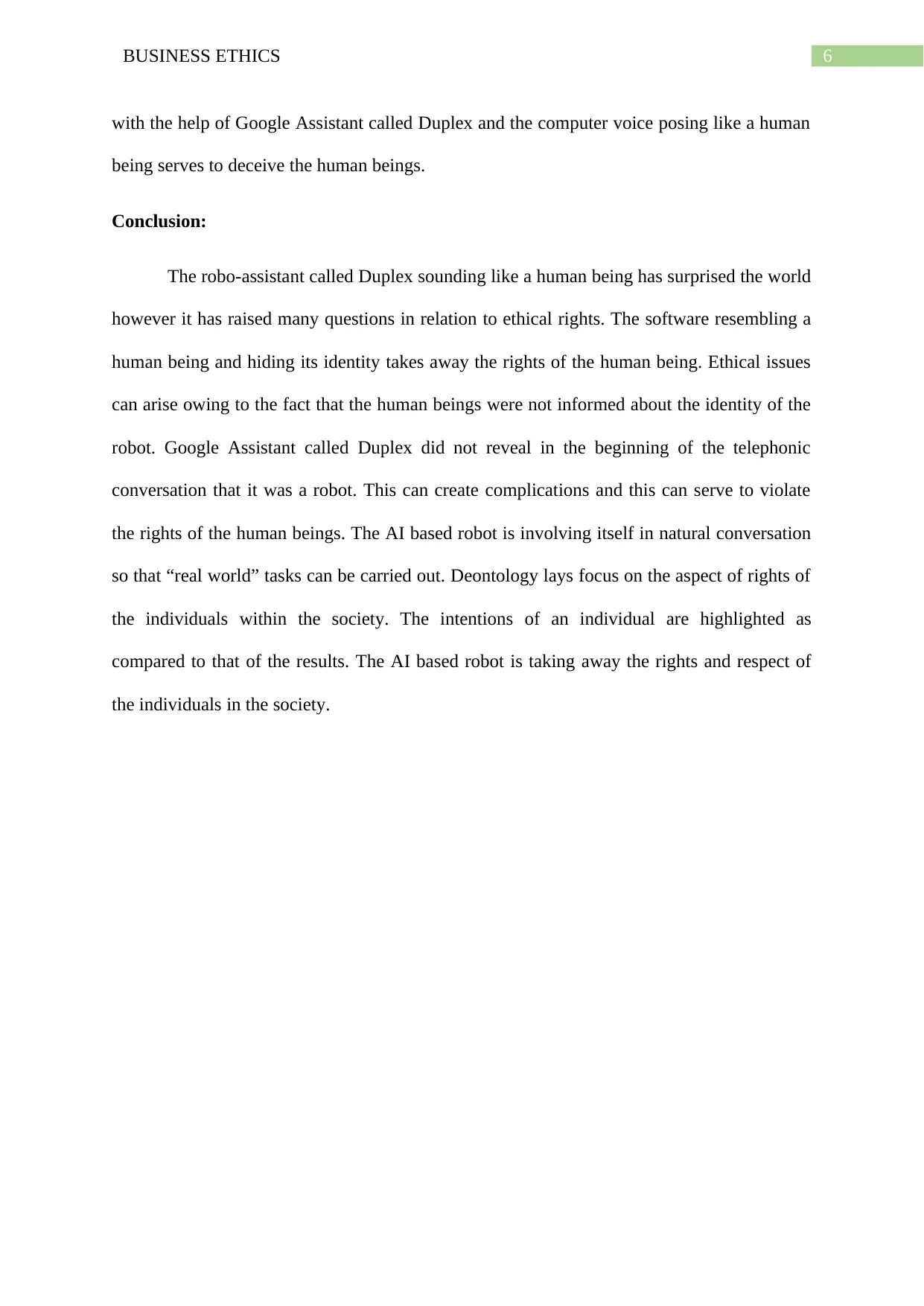
6BUSINESS ETHICS
with the help of Google Assistant called Duplex and the computer voice posing like a human
being serves to deceive the human beings.
Conclusion:
The robo-assistant called Duplex sounding like a human being has surprised the world
however it has raised many questions in relation to ethical rights. The software resembling a
human being and hiding its identity takes away the rights of the human being. Ethical issues
can arise owing to the fact that the human beings were not informed about the identity of the
robot. Google Assistant called Duplex did not reveal in the beginning of the telephonic
conversation that it was a robot. This can create complications and this can serve to violate
the rights of the human beings. The AI based robot is involving itself in natural conversation
so that “real world” tasks can be carried out. Deontology lays focus on the aspect of rights of
the individuals within the society. The intentions of an individual are highlighted as
compared to that of the results. The AI based robot is taking away the rights and respect of
the individuals in the society.
with the help of Google Assistant called Duplex and the computer voice posing like a human
being serves to deceive the human beings.
Conclusion:
The robo-assistant called Duplex sounding like a human being has surprised the world
however it has raised many questions in relation to ethical rights. The software resembling a
human being and hiding its identity takes away the rights of the human being. Ethical issues
can arise owing to the fact that the human beings were not informed about the identity of the
robot. Google Assistant called Duplex did not reveal in the beginning of the telephonic
conversation that it was a robot. This can create complications and this can serve to violate
the rights of the human beings. The AI based robot is involving itself in natural conversation
so that “real world” tasks can be carried out. Deontology lays focus on the aspect of rights of
the individuals within the society. The intentions of an individual are highlighted as
compared to that of the results. The AI based robot is taking away the rights and respect of
the individuals in the society.
Paraphrase This Document
Need a fresh take? Get an instant paraphrase of this document with our AI Paraphraser
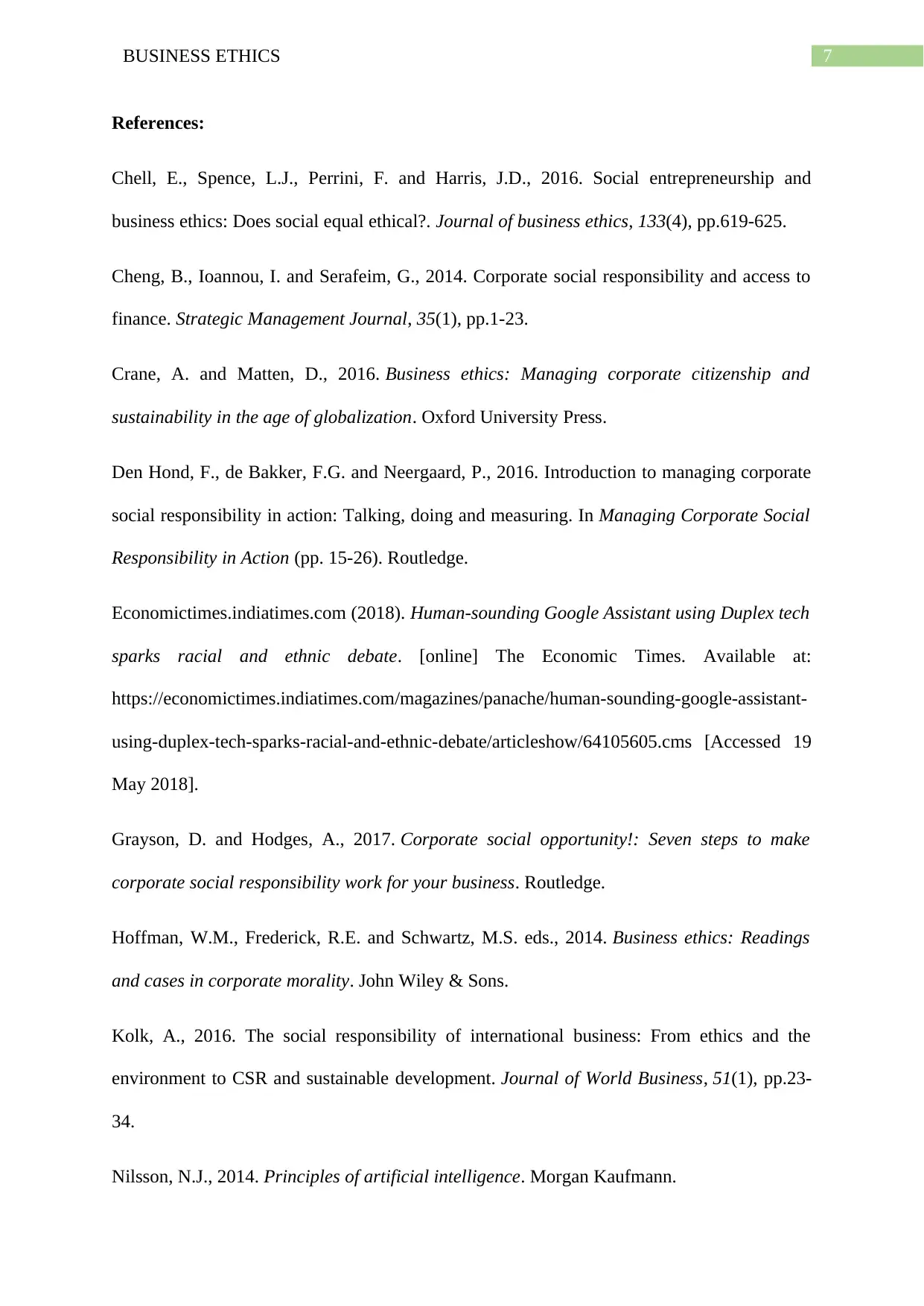
7BUSINESS ETHICS
References:
Chell, E., Spence, L.J., Perrini, F. and Harris, J.D., 2016. Social entrepreneurship and
business ethics: Does social equal ethical?. Journal of business ethics, 133(4), pp.619-625.
Cheng, B., Ioannou, I. and Serafeim, G., 2014. Corporate social responsibility and access to
finance. Strategic Management Journal, 35(1), pp.1-23.
Crane, A. and Matten, D., 2016. Business ethics: Managing corporate citizenship and
sustainability in the age of globalization. Oxford University Press.
Den Hond, F., de Bakker, F.G. and Neergaard, P., 2016. Introduction to managing corporate
social responsibility in action: Talking, doing and measuring. In Managing Corporate Social
Responsibility in Action (pp. 15-26). Routledge.
Economictimes.indiatimes.com (2018). Human-sounding Google Assistant using Duplex tech
sparks racial and ethnic debate. [online] The Economic Times. Available at:
https://economictimes.indiatimes.com/magazines/panache/human-sounding-google-assistant-
using-duplex-tech-sparks-racial-and-ethnic-debate/articleshow/64105605.cms [Accessed 19
May 2018].
Grayson, D. and Hodges, A., 2017. Corporate social opportunity!: Seven steps to make
corporate social responsibility work for your business. Routledge.
Hoffman, W.M., Frederick, R.E. and Schwartz, M.S. eds., 2014. Business ethics: Readings
and cases in corporate morality. John Wiley & Sons.
Kolk, A., 2016. The social responsibility of international business: From ethics and the
environment to CSR and sustainable development. Journal of World Business, 51(1), pp.23-
34.
Nilsson, N.J., 2014. Principles of artificial intelligence. Morgan Kaufmann.
References:
Chell, E., Spence, L.J., Perrini, F. and Harris, J.D., 2016. Social entrepreneurship and
business ethics: Does social equal ethical?. Journal of business ethics, 133(4), pp.619-625.
Cheng, B., Ioannou, I. and Serafeim, G., 2014. Corporate social responsibility and access to
finance. Strategic Management Journal, 35(1), pp.1-23.
Crane, A. and Matten, D., 2016. Business ethics: Managing corporate citizenship and
sustainability in the age of globalization. Oxford University Press.
Den Hond, F., de Bakker, F.G. and Neergaard, P., 2016. Introduction to managing corporate
social responsibility in action: Talking, doing and measuring. In Managing Corporate Social
Responsibility in Action (pp. 15-26). Routledge.
Economictimes.indiatimes.com (2018). Human-sounding Google Assistant using Duplex tech
sparks racial and ethnic debate. [online] The Economic Times. Available at:
https://economictimes.indiatimes.com/magazines/panache/human-sounding-google-assistant-
using-duplex-tech-sparks-racial-and-ethnic-debate/articleshow/64105605.cms [Accessed 19
May 2018].
Grayson, D. and Hodges, A., 2017. Corporate social opportunity!: Seven steps to make
corporate social responsibility work for your business. Routledge.
Hoffman, W.M., Frederick, R.E. and Schwartz, M.S. eds., 2014. Business ethics: Readings
and cases in corporate morality. John Wiley & Sons.
Kolk, A., 2016. The social responsibility of international business: From ethics and the
environment to CSR and sustainable development. Journal of World Business, 51(1), pp.23-
34.
Nilsson, N.J., 2014. Principles of artificial intelligence. Morgan Kaufmann.
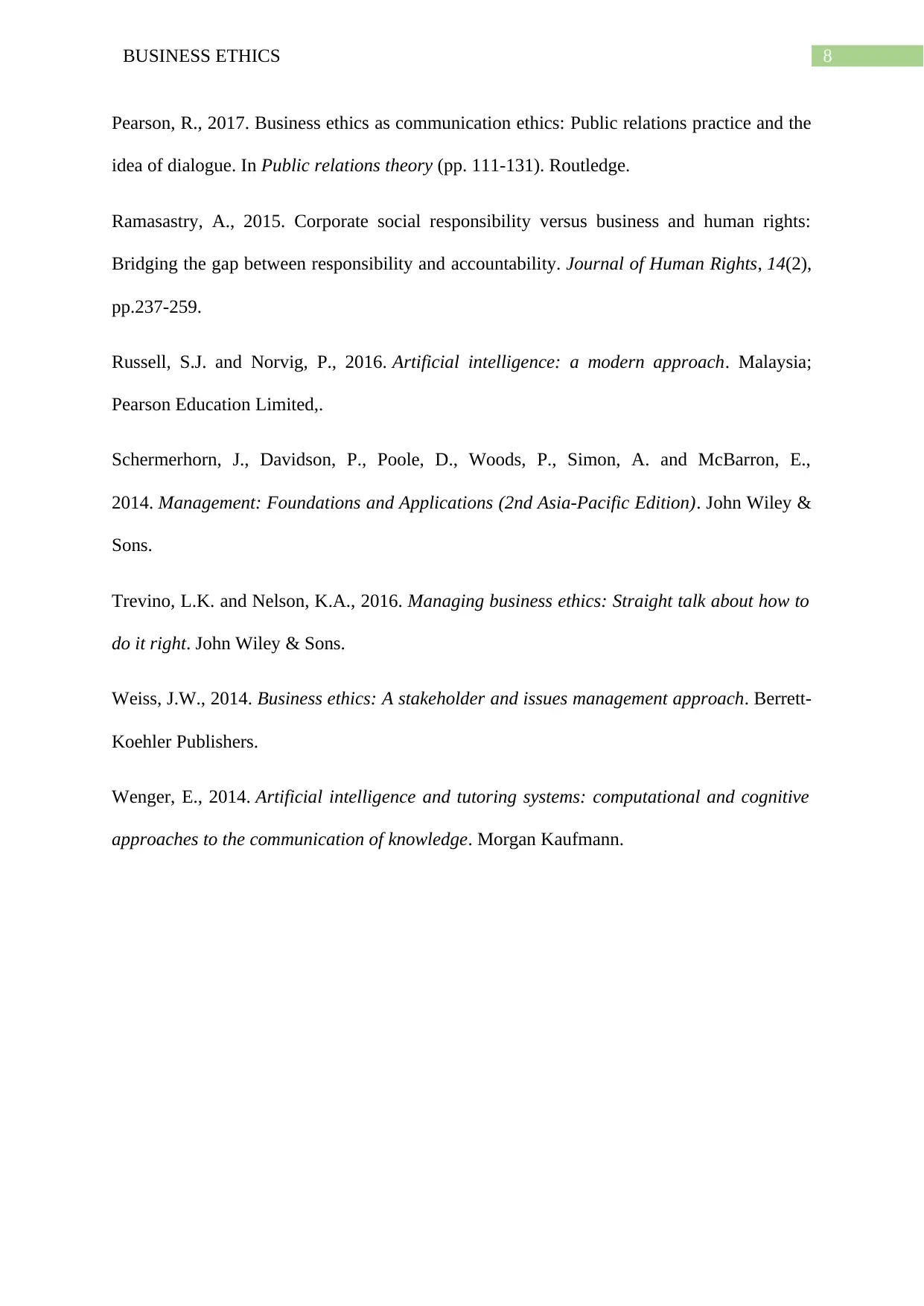
8BUSINESS ETHICS
Pearson, R., 2017. Business ethics as communication ethics: Public relations practice and the
idea of dialogue. In Public relations theory (pp. 111-131). Routledge.
Ramasastry, A., 2015. Corporate social responsibility versus business and human rights:
Bridging the gap between responsibility and accountability. Journal of Human Rights, 14(2),
pp.237-259.
Russell, S.J. and Norvig, P., 2016. Artificial intelligence: a modern approach. Malaysia;
Pearson Education Limited,.
Schermerhorn, J., Davidson, P., Poole, D., Woods, P., Simon, A. and McBarron, E.,
2014. Management: Foundations and Applications (2nd Asia-Pacific Edition). John Wiley &
Sons.
Trevino, L.K. and Nelson, K.A., 2016. Managing business ethics: Straight talk about how to
do it right. John Wiley & Sons.
Weiss, J.W., 2014. Business ethics: A stakeholder and issues management approach. Berrett-
Koehler Publishers.
Wenger, E., 2014. Artificial intelligence and tutoring systems: computational and cognitive
approaches to the communication of knowledge. Morgan Kaufmann.
Pearson, R., 2017. Business ethics as communication ethics: Public relations practice and the
idea of dialogue. In Public relations theory (pp. 111-131). Routledge.
Ramasastry, A., 2015. Corporate social responsibility versus business and human rights:
Bridging the gap between responsibility and accountability. Journal of Human Rights, 14(2),
pp.237-259.
Russell, S.J. and Norvig, P., 2016. Artificial intelligence: a modern approach. Malaysia;
Pearson Education Limited,.
Schermerhorn, J., Davidson, P., Poole, D., Woods, P., Simon, A. and McBarron, E.,
2014. Management: Foundations and Applications (2nd Asia-Pacific Edition). John Wiley &
Sons.
Trevino, L.K. and Nelson, K.A., 2016. Managing business ethics: Straight talk about how to
do it right. John Wiley & Sons.
Weiss, J.W., 2014. Business ethics: A stakeholder and issues management approach. Berrett-
Koehler Publishers.
Wenger, E., 2014. Artificial intelligence and tutoring systems: computational and cognitive
approaches to the communication of knowledge. Morgan Kaufmann.
⊘ This is a preview!⊘
Do you want full access?
Subscribe today to unlock all pages.

Trusted by 1+ million students worldwide
1 out of 9
Related Documents
Your All-in-One AI-Powered Toolkit for Academic Success.
+13062052269
info@desklib.com
Available 24*7 on WhatsApp / Email
![[object Object]](/_next/static/media/star-bottom.7253800d.svg)
Unlock your academic potential
Copyright © 2020–2026 A2Z Services. All Rights Reserved. Developed and managed by ZUCOL.





